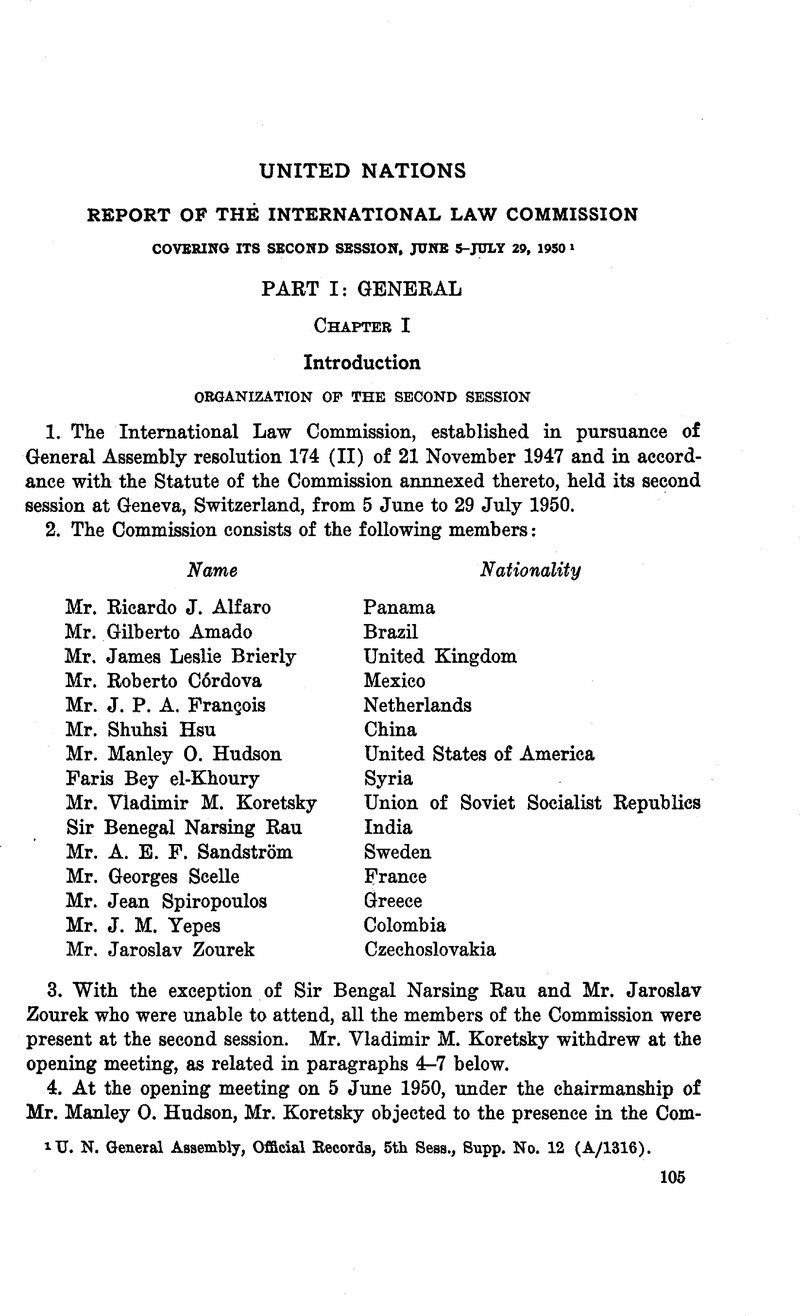Published online by Cambridge University Press: 20 April 2017

U. N. General Assembly, Official Records, 5th Sess., Supp. No. 12 (A/1316).
2 Revised provisional list prepared by the Secretary-General (A/CN.4/24).
3 Mr. Ricardo J. Alfaro declared that he voted in favour of Part III of the report with a reservation as to paragraph 96, because he believed that the reference therein contained regarding the task of formulating the Nürnberg principles should have been inserted in the report together with a quotation of the passage in the judgment of the Nürnberg Tribunal in which the Tribunal asserted that the Charter “is the expression of international law existing at the time of its creation, and to that extent is itself a contribution to international law.” In abstaining from the vote on this part of the report, Mr. Mauley O. Hudson stated that some uncertainty had existed as to the precise nature of the task entrusted to the Commission. In the report of the Commission covering its first session, which was approved by the General Assembly, the view was put forward that “the task of the Commission was not to express any appreciation of these principles [namely the Niirnberg principles] as principles of international law but merely to formulate them.” In his opinion, however, the Commission had not altogether adhered to that view in its later work, with the result that doubt subsisted as to the juridical character of the formulation adopted. Moreover, the formulation had not sufficiently taken into account the special character of the Charter and judgment of the International Military Tribunal and the ad hoc purpose which they served. Mr. Georges Scelle said that he regretted that he could not accept the view taken by the Commission of its task in this part of the report, for the same reasons as those which he had stated the previous year. The report did not enunciate the genefal principles of law on which the provisions of the Charter and the decisions of the Tribunal were based, but merely summarized some of them, whereas the Tribunal itself hadstated that the principles it had adopted were already a part of positive international law at the time when it was established. Moreover, he considered that the final text of the report did not seem to reflect accurately the conclusions reached by the Commission during its preliminary discussions, and restricted their scope.
4 Trial of the Major War Criminals before the International Military Tribunal, Vol. I, Nürnberg 1947, page 223.
5 Ibid.
6 Trial of the Major War Criminals before the International Military Tribunal, Vol. I, Nürnberg 1947, page 223.
7 Ibid.
8 Ibid.
9 Ibid., page 224.
10 Trial of the Major War Criminals before the International Military Tribunal, Vol. I, Nürnberg 1947, page 218.
11 Ibid.
12 Ibid., page 220.
13 Ibid., pages 221–222.
14 Ibid., page 216.
15 Ibid., page 224.
16 Ibid., page 225
17 Trial of the Major War Criminals before the International Military Tribunal, Vol. I, Nürnberg 1947, page 225.
18 Ibid., page 253.
19 During its discussion on the crime of killing hostages, the Commission took note of the fact that the Geneva Conventions of 12 August 1949, and more specifically Article 34 of the Convention relative to the Protection of Civilian Persons in Time of War, prohibit the talcing of hostages.
20 Trial of the Major War Criminals before the International Military Tribunal, Vol. I, Nürnberg 1947, page 254.
21 Ibid., page 226.
22 Ibid., pages 281, 287, 295, 298, 306, 314, 319, 320, 321, 330.
23 See Principle III in Part III of the present report.
24 See Principle IV in Part III of the present report.
25 The French term préjudidelle in the original text of the report of the special rapporteur might be better translated into English by the term “preliminary.”
26 The French term réousation used in the original text of the report of the special rapporteur might be better translated into English by the term “challenge.”
27 On this matter, see memorandum by the Secretariat (A/CN.4/30).